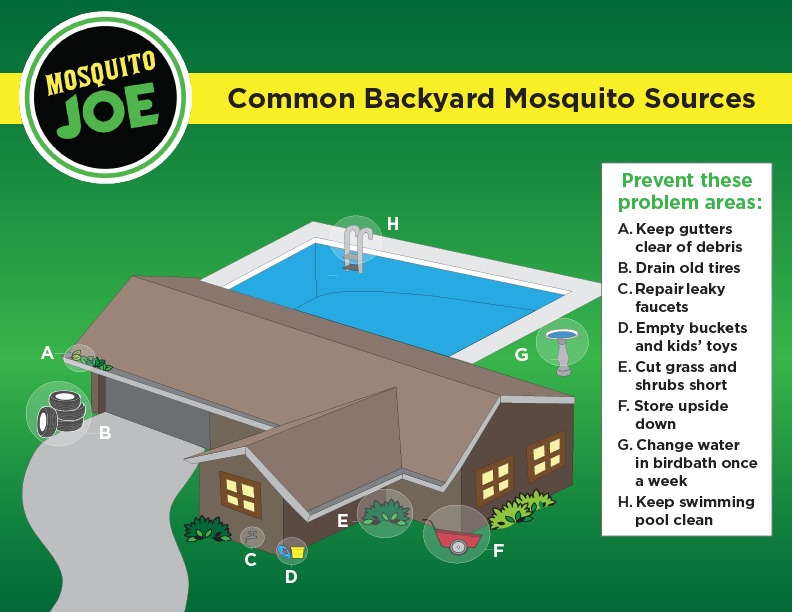Risks and Prevention of Common Mosquito and Tick Diseases
Being bitten by mosquitoes or ticks is never fun. In the best cases, bug bites leave you itchy and irritated for days. But ticks, mosquitoes, and other biting insects can be more than a nuisance; they can be deadly. Cases of diagnosed diseases resulting from infected mosquitoes, ticks, and fleas have tripled in the last 13 years, totaling more than 640,000 since 2004. Mosquito Joe is concerned about the rise in cases of Lyme disease, Zika virus, Rocky Mountain Spotted Fever, Malaria, West Nile, Eastern Equine Encephalitis, and other viruses and diseases. To keep your family, pets, and yourself healthy, you must be aware of the common tick diseases and diseases caused by mosquito bites and how to prevent them.
Common Mosquito Diseases
Malaria
Malaria is an acute illness that is marked by a fever caused by Plasmodium parasites. Outbreaks of locally transmitted cases of malaria in the US have been small and isolated, but the potential risk for the disease is present in areas with warmer temperatures, humidity, and more rainfall. In June of 2023, cases of malaria confirmed in the United States were classified as the Plasmodium vivax strain. The primary form of transmission is through the bite of an infected female Anopheles mosquito. However, because the malaria parasite can be found in the red blood cells of an infected person, this mosquito-borne disease can also be transmitted through blood transfusion, organ transplant, or shared use of contaminated needles or syringes.
Symptoms of malaria usually begin within 10 to 15 days after the bite of an infected mosquito and include fever, headache, and chills. Symptoms may be mild and, therefore, difficult to recognize as malaria. Fortunately, malaria is preventable and curable with the use of antimalarial medications.
Zika Virus
The Zika virus is primarily spread by infected Aedes mosquitoes. Common symptoms include joint pain, fever, rash, and conjunctivitis. The illness is usually very mild, with only one in five people exhibiting any symptoms. Those who have contracted Zika are unlikely to need hospitalization; severe illness or death is uncommon.
However, Zika symptoms can go undetected and can be transmitted from human to human through sexual contact or from mother to unborn baby. Cases have been reported in the United States since 2015. To learn more about the illness, visit our Zika virus resource page for more information.
West Nile
West Nile is a common mosquito-borne virus spread in North America and has been reported in all of the continental United States. In 2017, 2,002 cases were reported, and 67% of those were classified as neuroinvasive diseases such as meningitis or encephalitis.
Symptoms of West Nile virus (WNV) are relatively uncommon, and 8 out of 10 infected people don’t develop them. Those who do develop symptoms may experience headaches, body aches, joint pains, vomiting, diarrhea, or rash. While people of all ages can contract this severe illness, those over the age of 60 and those with existing health conditions are most at risk. Recovery time for WNV ranges from weeks to months. Unfortunately, there is currently no vaccine for the West Nile virus.
Chikungunya
Pronounced chik-en-gun-ye, this virus is transmitted via infected mosquitoes. Symptoms of chikungunya develop three to seven days after being bitten. The most common symptoms are fever and joint pain, but headaches, muscle pain, joint swelling, and rash have also been reported.
While chikungunya typically isn’t fatal, it can be debilitating. In 2013, chikungunya was reported for the first time in the Americas in the Caribbean. Those traveling to this area are especially at risk and are encouraged to use insect repellent, wear long sleeves and pants, and stay indoors to avoid contracting the virus.
Dengue Fever
Dengue fever is transmitted to humans by the bite of an infected mosquito, usually the Aedes aegypti. More than one-third of the world’s population is at risk of contracting the dengue virus. Dengue is most prevalent in tropical and subtropical areas; therefore, international travelers are most at risk. Symptoms of dengue include a combination of high fever and severe headache, eye pain, joint pain, muscle pain, bone pain, rash, or mild bleeding. There is no specific medication or treatment for dengue; those infected should seek medical attention, take pain relievers, and drink plenty of fluids.
Eastern Equine Encephalitis
Eastern Equine Encephalitis is commonly referred to as Triple E or EEE. This is a rarer vector-borne disease, and there are no available vaccines to prevent it or medicines to treat it. Every year there are reports of EEE from Michigan to Massachusetts, although most cases are found throughout the Gulf Coast states. Those who are unfortunate enough to contract EEE from an infected mosquito will experience symptoms including fever, chills, body aches, and joint pain. A third of those will die, and those who survive will often experience ongoing neurologic problems.
Common Tick Diseases
As if mosquitoes aren’t enough to worry about, ticks can pose a serious threat to your family’s health too. Tick-borne diseases have doubled in the last 13 years, accounting for more than 60 percent of all vector-borne diseases. Ticks have become a prevalent issue throughout the United States. Know the tell-tale signs of these illnesses transmitted by ticks to help keep you and your family protected.
Lyme Disease
Lyme disease is a common illness affecting people in many parts of the United States. Those in the northeastern U.S., midwestern U.S., and along the Pacific coast are the most at risk. Lyme disease is transmitted through the bite of an infected black-legged tick. Symptoms include fever, headache, fatigue, and a unique skin rash called erythema migrans. If Lyme disease is left untreated, it can spread to joints, the heart, and the nervous system. However, if treated with antibiotics in the early stages, those with Lyme disease can recover.
Rocky Mountain Spotted Fever
Rocky Mountain Spotted Fever (RMSF) is a bacterial disease that is spread by the American dog tick, Rocky Mountain wood tick, and brown dog tick. Cases are reported throughout the United States but are most common in North Carolina, Tennessee, Missouri, Arkansas, and Oklahoma.
Fever, headache, nausea, vomiting, stomach pain, and loss of appetite are common symptoms of RMSF. Almost all patients develop a rash two to four days after a fever begins. Early symptoms are not specific to RMSF, so if you become ill after being bitten by a tick, immediately seek medical attention. While RMSF can be treated with antibiotics, it can rapidly progress to a life-threatening illness if left untreated.
Risk Factors for Mosquito and Tick Diseases
Of course, proximity is the primary risk factor for getting bitten by a tick or mosquito carrying a specific disease. For instance, if the West Nile virus is prevalent in your area, or you travel to a location where there is an outbreak of malaria or Rocky Mountain Spotted Fever, you will be at a greater risk of getting bitten and contracting the disease. The more time you spend outdoors, especially in undeveloped, wooded, or natural areas, the more likely you will get bitten by ticks and mosquitoes. And the risks go up if you have a blood type that is attractive to ticks and mosquitoes. Even if you stay close to home, many factors may attract ticks and mosquitoes to your property, like standing water, overgrown grass, and other concerns. If you or a family member has a compromised immune system, you are at greater risk of getting sick from a bug bite.
Preventing Mosquito and Tick Bites
As with ticks, the best mosquito protection is a combination of approaches. First, take steps to prevent biters from settling on your property. Making your home and garden less attractive to pests is vital to any effective pest control program. Once you eliminate the attractions for ticks and mosquitoes, consider adding plants to your yard that repel the pests. And look for ways to attract the natural predators that feast on the biters. You can also use topical pest repellents and dress carefully outdoors. Wear loose, lightweight clothing that covers you from the neck to wrists, and make sure your ankles and feet are protected as well. Light colors do not attract mosquitoes the way darker, bolder colors do, and it is easier to spot ticks on white clothing than on dark.
Treatment and Management of Mosquito and Tick Diseases
Vector-borne diseases are infections transmitted by bites from arthropods such as mosquitoes, ticks, sandflies, and blackflies. Although common tick diseases differ from the diseases caused by mosquito bites, many symptoms are the same. If you find yourself or a family member exhibiting signs of vector-borne disease, seek prompt medical attention. These symptoms include:
- Fever
- Headache
- Abdominal pain
- Vomiting
- Muscle pain
- Rash
- Fatigue
- Joint pain
- Stiff neck
- Paralysis
While tick diseases may be treated with powerful antibiotics like Doxycycline and Rifampin, we still don’t have specific medical treatments for mosquito-borne diseases. However, your doctor can address the symptoms to make you more comfortable and prevent an escalation of your condition.
Protecting Yourself from Mosquito and Tick Diseases

Mosquito and tick populations are growing and moving throughout the country. As a result, incidents of vector-borne diseases are on the rise. But there is a lot that you can do to protect yourself, your family, and your pets. Here are some of the steps you can take:
- Minimize the presence of stagnant water on your property, as it provides an ideal breeding ground for mosquitoes. Regularly empty birdbaths, children’s toys, kiddie pools, tire swings, and gardening materials like watering cans and pots. Also, routinely clear gutters, and use soil to fill in low areas in lawns where rainwater may collect.
- Remove trash and leaf litter from your yard, as these are places where ticks like to hide.
- Plant pest-repelling plants.
- Mow your lawn frequently.
- Build fences around your property to inhibit animals such as deer, raccoons, and stray dogs from entering your yard.
- Use topical insect repellent.
- Bathe pets with flea and tick shampoo.
- Use pest-repelling candles, torches, or coils.
- Stay informed about new developments in pest migration and control.
- Hire expert pest control services.
Always remember that the best mosquito protection and tick prevention plans combine several pest control approaches.
Choose Mosquito Joe for Pest-free Enjoyment Outdoors
Taking simple precautions like these will lessen the risk of dangerous pests that can spread disease. Mosquito Joe can be an added layer of defense for you, your family, and your pets by working to eliminate fleas, ticks, and mosquitoes from your property. Trust the experts at Mosquito Joe to keep your home and garden free of pests. We provide customized pest control for residential and commercial properties across the country. All our work is backed by the Neighborly Done Right Promise™ and the Mosquito Joe Satisfaction Guarantee. So, request a quote using our online form, or give us a call at 1-855-275-2563, and get ready to wave goodbye to ticks and mosquitoes!



